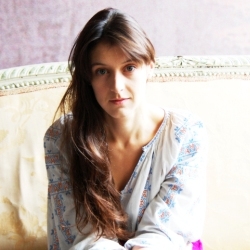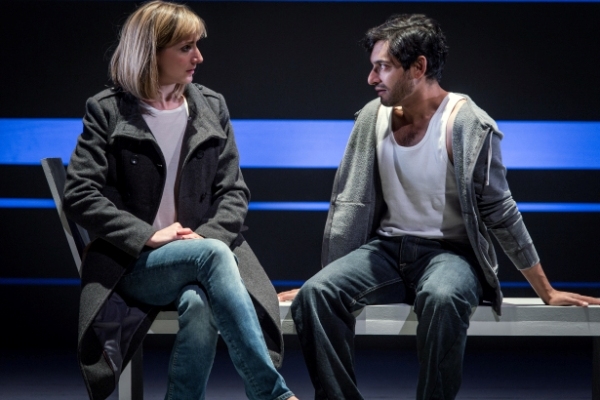Blanche McIntyre: 'When anyone says you're one to watch it’s an opportunity you have to grab'

How would you describe Ciphers?
It is a spy thriller, and it’s also a play about how well you can ever know another person, how well you can know yourself, how you read people and how you read situations. Dawn [King] calls it a play about identity and I think that’s right. It’s about a spy who has died and nobody knows what happened, and her sister sets out to find out what happened to her. So you have the parallel stories of the spy, tracking the last few months of her life, and you also have the story of the sister’s search. But the beauty of the play is that the spy and the sister are played by the same actor; in fact, there are only four actors playing eight parts and each of the pairs is in some way related.
Was the doubled casting your creative choice or was that written into the script?
That was always Dawn’s idea, she wrote it. That was part of what she was wanting to write; something where you have these people who are quite similar – not the same – and how the audience reads them, how they read each other and how they understand each other is a crucial part of what she’s working out in the play.
The spy thriller is now a familiar staple of film and television. Are you replicating or subverting that aesthetic with the staging of Ciphers?
When the designer and I sat down, one of the first things we said is that it mustn’t look like Spooks. There is an accepted way of doing it, or there is an understanding of a certain set of clues in television and film about how you set up a spy story, which doesn’t really work in theatre in the same way. One of the things about the play is that it’s so full of human mess and it’s so full of complexities and psychological interest that we thought that the worst thing we could do would be to cue people into taking it as a whizzy, slick, modern tale.
It’s like a rubix cube or a crossword puzzle in the way that it’s put together, and so when we were making a set of choices about it, a lot of it seemed to be about bringing out the patterns between the people and allowing the audience to read it and to decode the situation for themselves, rather than relying on the background to provide a sense of adrenaline or of glamour.
Have you had to think carefully about how much work you are asking the audience to do in piecing together the narrative?
I think that the appetite for an audience to do some work is much greater than one naturally thinks it is. It’s a little bit like when you’re reading an Agatha Christie, or watching an Agatha Christie on the telly; as you’re watching it you’re going “so she’s done this, so maybe it’s him, and so and so was there on the night and their alibi isn’t fitting”, and you want to be ahead of the game and you want to find out what the answer is.
And so I think that if it is set up clearly enough that this is part of the fun of the play, part of the interest of the play, then I think people will come on board with it. But from my point of view, I have to make sure that what is happening in every scene is entirely clear. I’ve got to make it as easy as possible for the audience to read the scene, while letting them know at the same time that reading the scene is part of the game.
If as an audience member you put in a little bit, the reward that you get is infinitely greater. And I think that’s part of the joy of live theatre – to sound really pretentious – that the audiences have to give something every night, which is why it’s different from film or telly where you can sit back and where it can play entirely the same without anyone watching it; if you’ve got a very active audience and a very quick audience, it will be a different kind of show. I think what we’re doing is taking that principle of the audience being the other half of the piece of theatre and just pushing that a little bit further.

© Robert Workman
How are you finding the experience of working with Dawn King again after Foxfinder in 2011?
It’s lovely working with her, it’s absolutely brilliant. She has this wonderful gift for very detailed but very spare writing which allows the actors to do their thing, it acts as a springboard for them rather than weighing them down. It’s incredibly freeing, her writing; you can go very, very deep with it.
How does Ciphers compare with Foxfinder?
Foxfinder is like a Greek tragedy. It’s incredibly spare, it’s very simple, it starts at A and goes to B – or maybe to Z – which makes it intensely powerful. Ciphers is much more ambitious; it reaches higher, it’s more fragmented, it tells two stories instead of one and it uses each one to comment on the other. So it’s very different in terms of its structure and a little bit in terms of its writing style. Foxfinder was one of the greatest pleasures to work on that I’ve had, and Ciphers is also an absolute delight. Qualitatively you can’t compare them, but in terms of the structure they’re interestingly different. She’s reaching much higher.
How would you describe your approach as a director?
I would say it depends each time on the text in question. I wouldn’t say that I have a different approach for new plays and for classics; in both cases I think what ideally I would do – or what you hope a director would do – is sit down with it and go “what are the bones of this play? What are the things that really need to be brought out? And what is the way that I can best honour that thing that’s written?”
The thing about theatre is it’s the human art form. You’ve got to have people making it, you’ve got to have people watching it – you don’t need anything else. You therefore can’t do landscapes, you can’t do abstracts, it simply doesn’t support that kind of subject. But as soon as you root something in a human experience, the whole thing comes alive and you can use it to ask deeper, more searching questions about all aspects of being alive and being human. I sort of think people have to make sense when you’re doing a play. You’ve got to take them seriously as people, the second they become cardboard cut-outs it’s extremely dull.
Given your interest in human experience and psychology, it sounds as though Ciphers is a perfect fit with you as a director.
It’s exactly the kind of play that I love. The way that they behave is beautifully observed and the way that they’re understood is very humane, so there are all kinds of riches there. You can watch all eight of the characters and find something interesting and enlightening in all of them. And also it’s a very gripping play, so it does all the things that I love about theatre.
You won the 2011 Critcs' Circle Most Promising Newcomer Award and you are often singled out as “one to watch”. Do you feel any pressure because of that recognition and expectation?
It’s always lovely to have somebody take something you do and say that it’s good. That’s a tremendous bonus at all times. The thing about the “one-to-watch-ness” is that at the moment I’m news, or I have been news in the last couple of years, and that will certainly go. In fact, I’m fairly sure that I’ll come down to earth with a massive crash at some point. I hope that it will be a slow levelling out rather than a huge bumping down to earth, but I know that it can’t last. No one can be a 'one to watch' forever, but what I would love to happen is that I manage to move into “oh, she regularly does good work”, which is the best that I can expect, as opposed to “well, we thought she was quite good but now it turns out she’s actually dreadful”, which would be sad.
The thing about anyone saying that you’re one to watch or whatever is that it’s an opportunity you have to grab. It’s like being given a show; it’s wonderful to be given a show, but the real test is whether you can be given a show by the same people twice.
Ciphers is currently on a UK tour, opening at the Tobacco Factory, Bristol this week (29 October-2 November) – visit www.outofjoint.co.uk for further dates










